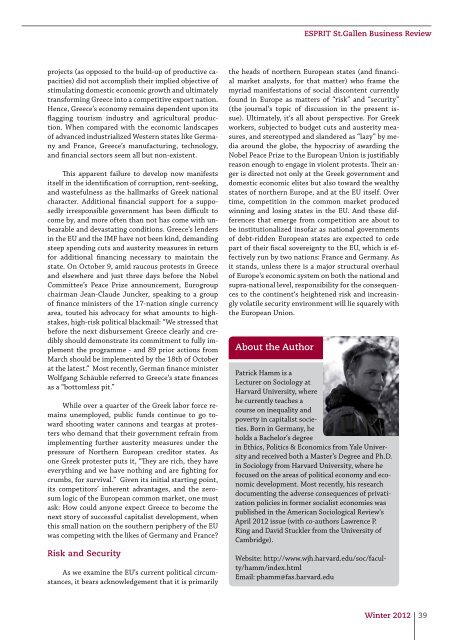Sicherheit und Risiko
St.Gallen Business Review Winter 2012
St.Gallen Business Review
Winter 2012
Sie wollen auch ein ePaper? Erhöhen Sie die Reichweite Ihrer Titel.
YUMPU macht aus Druck-PDFs automatisch weboptimierte ePaper, die Google liebt.
ESPRIT St.Gallen Business Review<br />
projects (as opposed to the build-up of productive capacities)<br />
did not accomplish their implied objective of<br />
stimulating domestic economic growth and ultimately<br />
transforming Greece into a competitive export nation.<br />
Hence, Greece’s economy remains dependent upon its<br />
flagging tourism industry and agricultural production.<br />
When compared with the economic landscapes<br />
of advanced industrialized Western states like Germany<br />
and France, Greece’s manufacturing, technology,<br />
and financial sectors seem all but non-existent.<br />
This apparent failure to develop now manifests<br />
itself in the identification of corruption, rent-seeking,<br />
and wastefulness as the hallmarks of Greek national<br />
character. Additional financial support for a supposedly<br />
irresponsible government has been difficult to<br />
come by, and more often than not has come with unbearable<br />
and devastating conditions. Greece’s lenders<br />
in the EU and the IMF have not been kind, demanding<br />
steep spending cuts and austerity measures in return<br />
for additional financing necessary to maintain the<br />
state. On October 9, amid raucous protests in Greece<br />
and elsewhere and just three days before the Nobel<br />
Committee’s Peace Prize announcement, Eurogroup<br />
chairman Jean-Claude Juncker, speaking to a group<br />
of finance ministers of the 17-nation single currency<br />
area, touted his advocacy for what amounts to highstakes,<br />
high-risk political blackmail: “We stressed that<br />
before the next disbursement Greece clearly and credibly<br />
should demonstrate its commitment to fully implement<br />
the programme - and 89 prior actions from<br />
March should be implemented by the 18th of October<br />
at the latest.“ Most recently, German finance minister<br />
Wolfgang Schäuble referred to Greece‘s state finances<br />
as a “bottomless pit.”<br />
While over a quarter of the Greek labor force remains<br />
unemployed, public f<strong>und</strong>s continue to go toward<br />
shooting water cannons and teargas at protesters<br />
who demand that their government refrain from<br />
implementing further austerity measures <strong>und</strong>er the<br />
pressure of Northern European creditor states. As<br />
one Greek protester puts it, “They are rich, they have<br />
everything and we have nothing and are fighting for<br />
crumbs, for survival.” Given its initial starting point,<br />
its competitors’ inherent advantages, and the zerosum<br />
logic of the European common market, one must<br />
ask: How could anyone expect Greece to become the<br />
next story of successful capitalist development, when<br />
this small nation on the southern periphery of the EU<br />
was competing with the likes of Germany and France?<br />
Risk and Security<br />
As we examine the EU’s current political circumstances,<br />
it bears acknowledgement that it is primarily<br />
the heads of northern European states (and financial<br />
market analysts, for that matter) who frame the<br />
myriad manifestations of social discontent currently<br />
fo<strong>und</strong> in Europe as matters of “risk” and “security”<br />
(the journal‘s topic of discussion in the present issue).<br />
Ultimately, it‘s all about perspective. For Greek<br />
workers, subjected to budget cuts and austerity measures,<br />
and stereotyped and slandered as “lazy” by media<br />
aro<strong>und</strong> the globe, the hypocrisy of awarding the<br />
Nobel Peace Prize to the European Union is justifiably<br />
reason enough to engage in violent protests. Their anger<br />
is directed not only at the Greek government and<br />
domestic economic elites but also toward the wealthy<br />
states of northern Europe, and at the EU itself. Over<br />
time, competition in the common market produced<br />
winning and losing states in the EU. And these differences<br />
that emerge from competition are about to<br />
be institutionalized insofar as national governments<br />
of debt-ridden European states are expected to cede<br />
part of their fiscal sovereignty to the EU, which is effectively<br />
run by two nations: France and Germany. As<br />
it stands, unless there is a major structural overhaul<br />
of Europe‘s economic system on both the national and<br />
supra-national level, responsibility for the consequences<br />
to the continent‘s heightened risk and increasingly<br />
volatile security environment will lie squarely with<br />
the European Union.<br />
About the Author<br />
Patrick Hamm is a<br />
Lecturer on Sociology at<br />
Harvard University, where<br />
he currently teaches a<br />
course on inequality and<br />
poverty in capitalist societies.<br />
Born in Germany, he<br />
holds a Bachelor‘s degree<br />
in Ethics, Politics & Economics from Yale University<br />
and received both a Master’s Degree and Ph.D.<br />
in Sociology from Harvard University, where he<br />
focused on the areas of political economy and economic<br />
development. Most recently, his research<br />
documenting the adverse consequences of privatization<br />
policies in former socialist economies was<br />
published in the American Sociological Review‘s<br />
April 2012 issue (with co-authors Lawrence P.<br />
King and David Stuckler from the University of<br />
Cambridge).<br />
Website: http://www.wjh.harvard.edu/soc/faculty/hamm/index.html<br />
Email: phamm@fas.harvard.edu<br />
Winter 2012 39


















